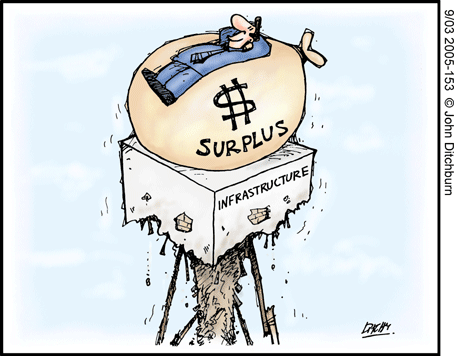
|
|
|
|
|
|
|
News & Views item - December 2005 |
![]() A Vice-Chancellor Under Fire and That $11.5 billion Federal Budget Surplus are
Not Unrelated. (December 19, 2005)
A Vice-Chancellor Under Fire and That $11.5 billion Federal Budget Surplus are
Not Unrelated. (December 19, 2005)
Today's editorial in The Age in commenting on the resignation of La Trobe University's Vice-Chancellor, Michael Osborne, points out the predicament of Australian university vice-chancellors who try to balance leading an institution of learning and fundamental research with increasing pressure by governments and the private sector whose priorities are the short term goals of converting them into commercially profitable training colleges and on-call sources of applied research and development.
The Age writes that Professor Osborne:
...recently gave a speech in Beijing in which he lamented the "tide of economic rationalism (that) threatens to engulf universities". He wrote, "in the 16 years that I have served as a university vice-chancellor in Australia, I have seen a distinct change in the public perception of universities from one that regards them as slightly remote places predominantly devoted to learning to one that sees them as essentially functional enterprises, expected to make money and to train their inmates to do so too". Professor Osborne was particularly concerned about the declining status of social science and humanities subjects - the great strength of his own university. He wrote that the growing tendency to link a university education to employment meant that learning for its own sake had become a musty ideal while humanities and social sciences "are to be regarded as, at best, a luxurious irrelevance, at worst as an excuse for irritating and inconvenient criticism of government policies".
Vice-Chancellor for 16 years, Professor Osborne has been the recent focus of criticism for several quarters which culminated late last week with his resignation effective July 2006 18 months prior to the end of his contract.
In October, the dean of the university's faculty of health science, Stephen Duckett, resigned, writing in an email to staff that "despite increased university income, resources to support the core teaching and learning activities have continued to decline, causing increased workloads and/or declining quality".
Then La Trobe politics professor Judith Brett instigated the letter to Professor Osborne, after the vice-chancellor invited staff to comment on the university's direction. The letter over the signature of 13 humanities and social science professors commented on what they considered to be the "very poor" performance of the university in obtaining research grants. In their view La Trobe's "research status is under real threat".
And what appears to have been a last straw were questions raised by Victorian state parliamentarians regarding the vice-chancellor's overseas travel expenses over the past several years. The university declined to release the cost of the trips saying no Commonwealth or state money was used to fund them.
In the opinion of The Age "At the very least, Professor Osborne's story tells of the difficulty of juggling the various roles now required of a vice-chancellor. Vice-chancellors are expected to be ambassadors for their institutions and chief executives of multimillion-dollar businesses, while also heading a body that receives public funding and that exists to serve the public."
The Age editorial might also have pointed to a paragraph from its recent opinion piece by Monash University's vice-chancellor, Richard Larkins:
What we are really talking about is micro-regulation and control by a government... Perhaps instead of the ideological trivia, we should have the Government focusing on why public expenditure per Australian student has fallen 30 per cent in real terms since 1995, the biggest fall of any country in the OECD and in stark contrast to marked increases in public expenditure in many countries that seem to value their young people and the contribution they can make to economic development. Both political parties have contributed to this. The Labor Party introduced the farcical "indexation" system that delivers increases in funding of 1.5 per cent to 2 per cent a year at a time when costs are rising by 6 per cent to 8 per cent. The Government might also ponder if the rise in the student/staff ratio from 14 to 1 in 1994 to 20 to 1 now is desirable.
Now in what may be the most stinging rebuke of government and elements of the private sector, The Sydney Morning Herald's economics editor, Ross Gittins writes,
We're being railroaded by the rich and powerful, who're telling us that, with his embarrassingly large budget surplus, John Howard has no choice but to cut taxes in a big way... You'd think that [the tax cuts they'd already received] would be sufficient to prompt those who've been urging a cut in the top rate to put their campaign on the back burner and focus on higher-priority problems. Not a bit of it. So great is their greed - and their lovingly nurtured sense of righteous indignation - that the campaign for tax cuts for the rich has scarcely missed a beat.
An area of glaring public sector underperformance is spending on indigenous services - health, housing and education. The outcomes in these fields - life expectancy, educational attainment, unemployment - are disgraceful and indefensible. Improving them would take a lot more money (wisely spent).
We could profitably be spending a lot more on preventive medicine and health promotion.
We are underspending on environmental remediation - water, land use and climate change...
And let me make a fearless prediction: before many years have passed and we're in the full throes of skilled labour shortage following the retirement of the baby boomers, it will be commonplace to curse the Howard Government for its decade of inadequate spending on skill formation: public schooling, universities and technical training.
We'll be saying, how could Howard have been so amazingly short-sighted?